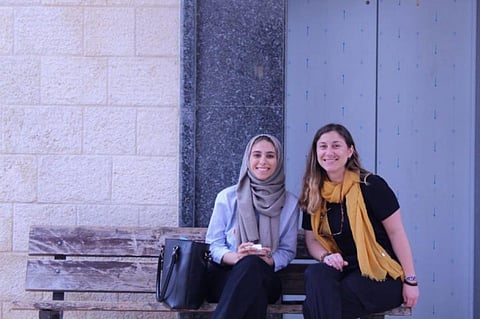‘Restrictions have been lifted, but people’s spirits are broken’
Asil Qraini is 23 years old. She grew up and lives in the city of Nablus, West Bank of Palestinian territory. The group of Pressenza, as part of a wider mission to the West Bank, met Asil while visiting the Al Najah University. Asil tells Christina how she and her family have been living amid the pandemic.
Christina: At what stage did the West Bank lift novel coronavirus disease (COVID-19) restrictions? How has your daily life, studies, work, traveling, etc been affected?
Qraini: Restrictions were imposed on us from the Israelis and the PA due to the spread of the virus. The PA had us in complete lockdown for almost three months, and only bakeries and pharmacies were allowed to remain open.
The rules of curfew changed throughout those months. No travelling was allowed between the cities; neighborhoods within the same city were cut off with heavy security and checkpoints. Those who didn’t abide by those restrictions were slapped fines and their cars were taken away. We didn’t have any public transport until very recently; private taxis were allowed to ply on roads during lockdown, but they could only carry two passengers.
The latter was a challenge because my family and I live in a remote part of the city and don’t own a car.
I had been working as a freelancing translator and interpreter before the lockdown and have been unemployed for months now. My family, like many others, is barely making it through. My sister, a software engineer, and I are the only providers. Her salary was halved. But I still consider us on the lucky side for having a stable source of income.
My daily life was affected for I left home only for little walks around the house and rare grocery trips. I didn’t see any friends or family members for weeks.
Christina: According to the World Health Organization, there have been approximately 602 confirmed cases and five deaths in West Bank and Gaza Strip; What helped these areas avoid a major disease outbreak?
Qraini: Maybe yes, the lockdown helped a bit. But the way I see it, it caused more harm.
Christina: Every person around the world holds a different experience regarding the lockdown. How did people experience it in the West Bank? Are there any clear differences between the three areas of West Bank?
Qraini: Almost all areas followed the same rules, as far as I know. But from the very beginning, villages and refugee camps were cut off from cities and neighborhoods. This whole situation was far from a “pause” for most Palestinians. I can say that things are still not normal. The restrictions have been lifted, but people’s spirits are broken, and there’s tension and anxiety.
Unemployment rates and uncertainty are high.
Christina: Has COVID-19 caused any change in Israel’s policies to Palestine? Do you think COVID-19 has been used as an additional threat for Palestinian people?
Qraini: I think it was used as an excuse to pose more restrictions on movement, industries, farming and pretty much all aspects of life. Not to forget how Israel destroyed an emergency field hospital that was set up to fight COVID-19.
Christina: Are there any remarkable Palestinian and / or Israeli movements / initiatives that tried to stay active and responded to the needs? How is the youth trying to overcome the challenges?
Qraini: A Palestinian brand named BabyFist was raising money and making masks and donating them to non-profits in Gaza. Another Palestinian designer, Yazan Zeit, has also been donating fabric masks.
Christina: Are there any positive outcomes from the current situation?
Qraini: Realistically speaking, I can’t think of any positive outcomes.
The interview has been republished from Pressenza. Read the original article here.

